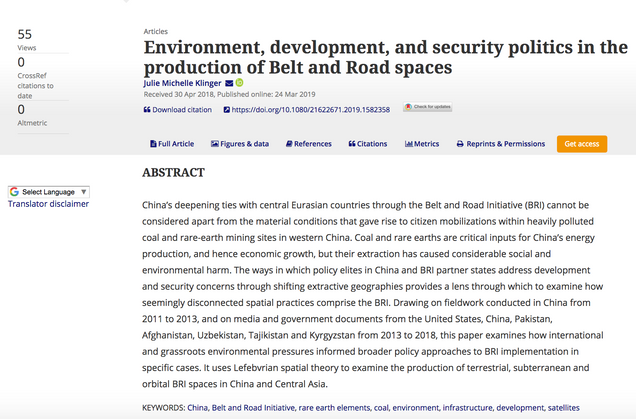Julie Klinger Publishes Journal Article on Environmental Activism, Geological Survey, and Expansion of Satellite Networks in BRI
Julie Klinger, Associate Director of the Global Development Policy Center’s Land Use and Livelihoods Initiative (LULI), recently published a journal article environmental activism, geological survey, and the expansion of satellite networks in the Belt and Road Initiative (BRI) in the journal Territory, Politics, Governance on March 24, 2019.
Klinger’s article, entitled “Environment, development, and security politics in the production of Belt and Road spaces,” examines how environmental pressures -international and grassroots – informed China’s broader policy approaches to BRI implementation in specific cases.
Here is the complete abstract of the article:
China’s deepening ties with central Eurasian countries through the Belt and Road Initiative (BRI) cannot be considered apart from the material conditions that gave rise to citizen mobilizations within heavily polluted coal and rare-earth mining sites in western China. Coal and rare earths are critical inputs for China’s energy production, and hence economic growth, but their extraction has caused considerable social and environmental harm. The ways in which policy elites in China and BRI partner states address development and security concerns through shifting extractive geographies provides a lens through which to examine how seemingly disconnected spatial practices comprise the BRI. Drawing on fieldwork conducted in China from 2011 to 2013, and on media and government documents from the United States, China, Pakistan, Afghanistan, Uzbekistan, Tajikistan and Kyrgyzstan from 2013 to 2018, this paper examines how international and grassroots environmental pressures informed broader policy approaches to BRI implementation in specific cases. It uses Lefebvrian spatial theory to examine the production of terrestrial, subterranean and orbital BRI spaces in China and Central Asia.
 Dr. Julie Michelle Klinger (Ph.D. Geography) is an Assistant Professor in the Frederick S. Pardee School of Global Studies, Associate Director of the Global Development Policy Center’s Land Use and Livelihoods Initiative, and Faculty Affiliate at the Pardee Center for the Study of the Longer-Range Future. Her research focuses on the dynamics of global resource frontiers, with a particular focus on social and environmental sustainability. In particular, she examines how diverse forms of violence and strategies for survival shape land use, environmental conservation, and livelihood security. Some of Dr. Klinger’s research experience includes rural development in the Himalayas; Brazil-China relations; the impacts of rare earth mining around the world; and the role of international outer space cooperation in global development. Her research uses qualitative and quantitative methods combined with extensive fieldwork. She often works in local languages with diverse stakeholders to uncover the root causes of environmental degradation and livelihood insecurity. She is committed to finding collaborative solutions to the most pressing sustainability issues of our time.
Dr. Julie Michelle Klinger (Ph.D. Geography) is an Assistant Professor in the Frederick S. Pardee School of Global Studies, Associate Director of the Global Development Policy Center’s Land Use and Livelihoods Initiative, and Faculty Affiliate at the Pardee Center for the Study of the Longer-Range Future. Her research focuses on the dynamics of global resource frontiers, with a particular focus on social and environmental sustainability. In particular, she examines how diverse forms of violence and strategies for survival shape land use, environmental conservation, and livelihood security. Some of Dr. Klinger’s research experience includes rural development in the Himalayas; Brazil-China relations; the impacts of rare earth mining around the world; and the role of international outer space cooperation in global development. Her research uses qualitative and quantitative methods combined with extensive fieldwork. She often works in local languages with diverse stakeholders to uncover the root causes of environmental degradation and livelihood insecurity. She is committed to finding collaborative solutions to the most pressing sustainability issues of our time.
